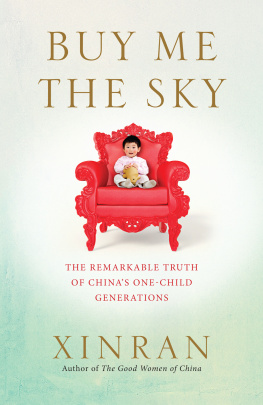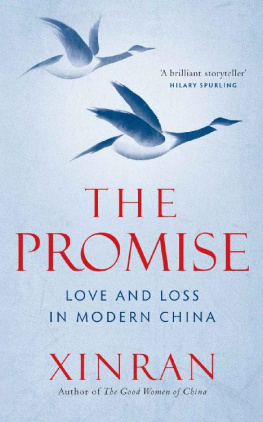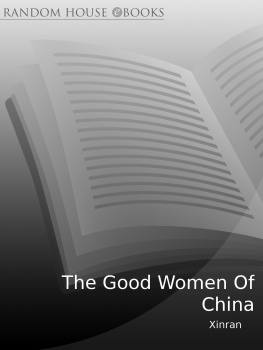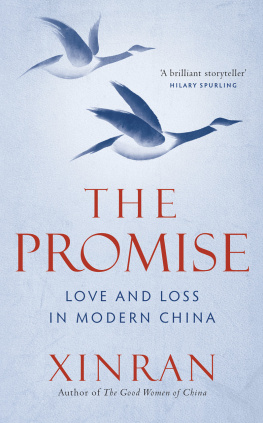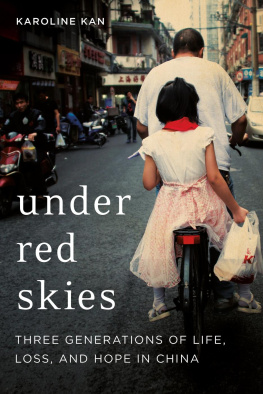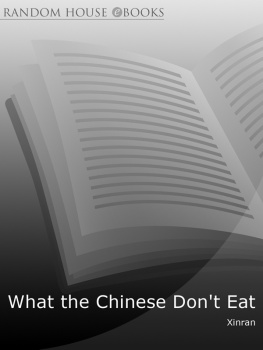ABOUT THE BOOK
Born between 1979 and 1984, the first generation raised under Chinas single-child policy has reached adulthood. When Xinran set out to interview these men and women, she expected to find a prosperous peer group enjoying incredible opportunities. Instead, she found them adrift between clashing cultures, swept up in unprecedented change.
While China transforms at the speed of light, new generations of precious one and onlies are burdened with expectation, yet raised without a sense of responsibility. Within their families, they are treated as little emperors. But such cosseting comes at a high price: isolation, confusion and an inability to deal with lifes challenges.
In Buy Me the Sky, Xinran shares the stories of those born in the one-child generations from the business mans son unable to pack his own bag, to the PhD student who hauled herself out of extreme rural poverty. Through the fascinating lives of these only children and their upbringing, we see the emerging face of a superpower and glimpse Chinas global future.
ABOUT THE AUTHOR
Born in Beijing in 1958, Xinran was a journalist and radio presenter in China. In 1997 she moved to London, where she wrote her bestselling book The Good Women of China. Since then she has written a regular column for the Guardian, appeared frequently on radio and TV, and published Sky Burial, What the Chinese Dont Eat, Message from an Unknown Chinese Mother, the novel Miss Chopsticks and a ground-breaking work of oral history, China Witness. Her charity, The Mothers Bridge of Love, was founded to help disadvantaged Chinese children and to build a bridge of understanding between the West and China.
By the same author:
The Good Women of China
Sky Burial
What the Chinese Dont Eat
Miss Chopsticks
China Witness
Message from an Unknown Chinese Mother
ACKNOWLEDGEMENTS
My Heartfelt Thanks
Each time I write acknowledgements, I am reminded of the narrowness within words and between lines. Every expression of thanks feels like a new seed planted in my life, so that my writing and life are lived in a green forest of gratitude.
It was Toby, my husband, who first encouraged me to write this book. He said that the world needs to understand this age created by Chinas first generation of only children. An age highly vulnerable to storms within the family, with every member suffering from this pressure in isolation. It is an age when social awareness and values have mutated, and what is being passed on to these new lives has had to navigate a series of massively changing faults and dislocations. It is an age of power politics, but also one of constraint, as China will struggle to expand its supremacy in the outside world when its people are unwilling to send their only children off to be soldiers. Thank you, my Toby, for being the driving force behind my writing.
But it was my only son Panpan who really caused me to live within this book. I once longed for many children, and dreamed of their games, squabbles and noisy jokes. I dreamed of presiding over their debates, dreamed of my brood sharing the small responsibilities of the household, dreamed of taking them to the fields for picnics, tasting and enjoying the delicacies each child had produced, and I dreamed of them one by one creating families and careers for themselves and presenting me with a series of cherubic grandchildren! The one-child policy deprived me of the right to become a mother to a crowd of sons and daughters, but by a stroke of great good fortune, I did become Panpans mother. From that day forth, I warned myself never to let Chinese parents traditional power or social pressures destroy my only son.
Like the mothers of all the only children in this book, the price I paid for my child was my own life. I was turning myself into bricks and mortar for his happiness, even willingly letting myself rot away into compost so that he might grow well and thrive, but I myself was never free. I piled all my hopes on his lonely shoulders. It had never occurred to me that the dreams of parents weigh heavily on their children. It was only when I met the young people described in this book, my sons contemporaries, and saw their struggles and hardships that I became aware of Panpans loneliness. I would like to thank my child, Panpan, for sharing the weighty burden of life with me for twenty-four years. For working hard and forging ahead to repay his mother for raising him, and for helping me to enter into the hearts and souls of only children.
No matter how limited the space, and regardless of the poverty of my language, the one thing I must not leave undone is to thank the young people in this book. Without them, I would have had no way to understand this unique age of only children in such detail. Without them, I could not possibly have had this multi-layered reading of the only-child phenomenon. Without them, it would have been impossible for me to understand as I do the direction in which China is developing. Without them, I would not have been able to write this book. Without them, I would perhaps never have experienced my own dear childs solitary happiness, anger, grief and joy.
Thank you, Du Zhuang, for the clashes you went through in your first taste of independence. You opened the door that led me towards the first generation of only children. Thank you, Golden Swallow. Your brave flight gave me more space to see your generation. Thank you, Wing, for your ability to change the channel of your life, and ease my anxieties as a mother of an only child. Thank you, Lily, for the honesty and candour with which you live your life. Your pursuit of your beliefs comforts and inspires me with the knowledge that there will always be people to carry on Chinas traditions. Thank you, Moon, for your wise and far-sighted views, your perceptive understanding of Chinese society and your pain at the changing world of family emotions that has led me to ponder Chinas only-child families. Thank you, Shiny, for your description of the many-coloured lives of only children. Your stubborn affirmation of Chinas rights and wrongs reawakened my passionate spirit, which age had come close to driving into hibernation. Thank you, Firewood, for your will to strive against your fate in this world of the new millennium. You confirmed for me Chinese peoples strength of will, like a single spark that sets the plains ablaze. Thank you, Glittering, for your ethics and ideas on right and wrong founded on emotions. You left me deeply moved by the Chinese spirit living within you single sprouts, a spirit that is becoming more healthy and vigorous by the day. Thank you, Flying Fish, for your daughterly love that politics and society could not destroy. It was a balm for my pain when I heard of the fathers and mothers who abandoned their only children for personal gain. Thank you, my teachers. With your boundless energy you have nurtured wings as wide as an eagles in your insect-like living spaces. You have given humankind pride in, and hope for, the Chinese people!
I am certain that from today onwards, China will thank your generation and your parents generation for your gifts. Because of the price you paid, the spirit and roots of Chinese people have not dried up. The painful experiences of two generations of Chinese have not been forgotten. Chinas future has not been cut off or lost its way from its history because of man-made politics, because you hold the generations together, forming a link between what has gone before with what will come after.
My thanks to all the volunteers at Mothers Bridge of Love (MBL). Without your knowledge, your confirmation of my ideas and your contribution to my collection of experiences, this book might have been no more than the far-distant image of a lonely sail in the flood-tide of only children, buffeted to and fro by the current in Chinas age of great collisions. The support of the MBL volunteers has made this book more like a member of a vast crew of only children on the same ship, observed and gazed at from afar by the skies and oceans of the world.

